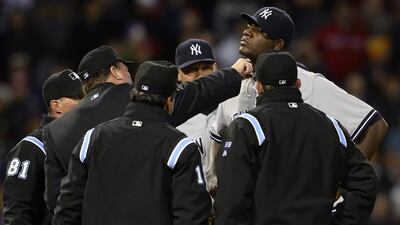Trying anything to gain an advantage is a thread that runs through almost all sports, but few so eagerly embrace the “it’s-only-cheating-if-you-get-caught” ethos as baseball.
New York Yankees pitcher Michael Pineda was ejected from Wednesday’s game against the Boston Red Sox for having a foreign substance – later confirmed to be pine tar – on his neck. It was his second such offence this season, having been found with pine tar on his hand in an April 10 game against Boston.
Pineda was suspended 10 games for his use of pine tar, a sticky substance that pitchers sometimes use to better grip the ball. To hear much of the baseball commentary, though, one would think Pineda's crime was not using an illegal substance, but failing to sufficiently hide that use. There were even suggestions that Boston looked the other way initially because some of their pitchers are known to dabble in pitching's dark arts.
This incident is the latest illustration of baseball's complicated relationship with cheating. This is a sport where doctoring the ball, stealing signs and using corked bats are quaint, almost charming acts rather than subversions of the rules. Players using performance-enhancing drugs was all but an open secret until 2002, when revelations by Jose Canseco and Ken Caminiti forced Major League Baseball to deal with the problem.
Attempts to excuse or downplay Pineda's actions ring hollow. The most prevalent rationalisation, that use of pine tar is widespread , does not change the fact that it is against the rules – Rule 8.02, parts (a), (b), (4) and (5), to be exact. To paraphrase Craig Calcaterra of Hardball Talk, driving 160 kph in 100 kph zone in a Corvette while blowing your horn and screaming out the window, "I'm breaking the law," is no worse than driving 160 kph in 100 kph zone in a Buick.
You are still driving 160 kph.
As for the suggestion that pitchers using pine tar is in batters’ best interest, former New York Mets pitcher Dwight Gooden offered a nice riposte in successive tweets.
“[L]ets put to rest all this talk about pine tar to get a better grip on the ball to protect the hitters!,” Gooden tweeted. “Pine tar is used 2 make ur breaking pitches sharper & help ur sinker 4 more movement!
“[Y]ou can blow in your hand for a better grip when it’s cold... enough already!”
Enforce the rule or change it.
Sports lose something when the rule book does not reflect the rules being used on the field, and tacit approval of cheating does not do the fans, players or baseball any favours.
pfreelend@thenational.ae
Follow us on twitter at @SprtNationalUAE

